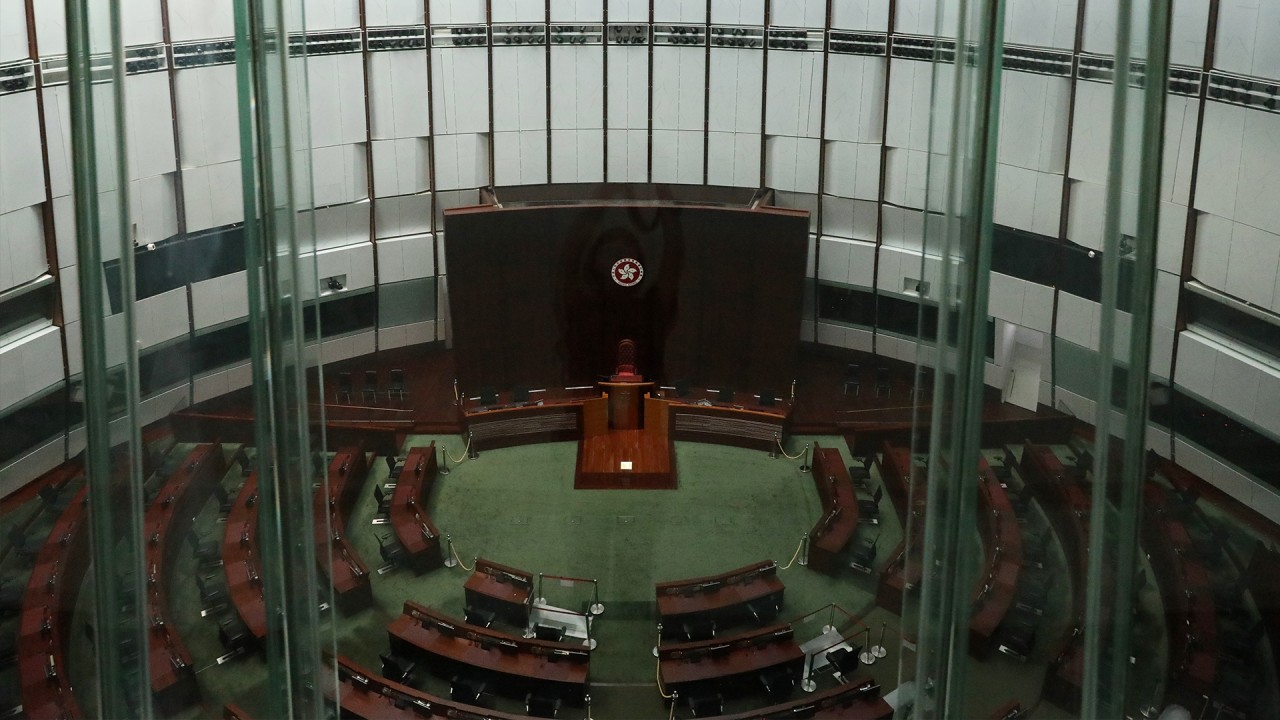
Vague decision by China’s top legislative body, but disqualified Hong Kong lawmakers expected to serve out Legco term: experts
- Though Beijing did not address the issue head-on, those close to the matter say opposition Legco members barred from re-election can serve out extra year
- One academic argued the decision undermines city’s autonomy, though pro-establishment figures insist it is ‘conducive to social stability’
In doing so, however, it also unleashed a raft of questions that the Hong Kong government and the opposition will now have to grapple with.
Beijing extends Hong Kong legislature for a year but no word on disqualified lawmakers
The four opposition lawmakers, meanwhile, said they would listen to different opinions before deciding whether they would serve the extended year.
Albert Chen Hung-yee, a member of the Basic Law Committee, which advises Beijing on Hong Kong’s mini-constitution, said the resolution was a provisional and exceptional arrangement to handle the emergency situation triggered by the postponement of the elections.
“I think the NPCSC adopted the simplest method to address the issue. It’s also the least controversial option,” he said.
Chen, for his part, said the four opposition lawmakers would be able to stay on in the extended term, as the resolution provided no legal basis for banning them.
Eric Cheung Tat-ming, a legal scholar at the University of Hong Kong, said the NPCSC was entitled to issue the resolution on top of the relevant Basic Law provision, but warned the intervention has undermined the city’s autonomy.

01:25
China’s top legislative body extends Legco by ‘not less than one year’
But Li Xiaobing, a Hong Kong specialist and a law professor at Nankai University in Tianjin, said the NPCSC was the “guardian of Hong Kong’s constitutional order”.
“It’s not just the body which interprets the Basic Law provisions. It’s also empowered to make appropriate decisions in accordance with actual situations in Hong Kong to protect the city’s interests,” he said. “It’s a rational decision to address the emergency situations in Hong Kong amid the coronavirus outbreak.”
Li also said the four opposition legislators barred from seeking re-election would be allowed to stay in the legislature alongside their colleagues. “The decision shows the central government’s respect for the ‘one country, two systems’ concept,” he added.
China amends national flag law, changes will apply in Hong Kong
He said disqualification from running in elections and the qualifications of incumbent lawmakers were two different matters. “Whether a serving lawmaker can stay in the extended term should not be handled by the NPCSC. It’s better to leave the issue to Hong Kong,” Li said.
As for whether serving lawmakers would need to take an oath to stay for the extended term, Li said it was up to Legco and the Hong Kong government to decide.
“It doesn’t matter if they decide there is no need to do so,” he said.
Ronny Tong Ka-wah, a member of the Executive Council, Chief Executive Carrie Lam Cheng Yuet-ngor’s de facto cabinet, also said the four disqualified lawmakers could stay in the extended term, and insisted any oath-taking would be unnecessary.
“There is no requirement under existing laws in Hong Kong for incumbent lawmakers to take an oath again,” he said.

Tong described the NPCSC’s decision as a “minimalist approach” towards handling the potential vacuum triggered by the postponement of Legco elections – one that left the detailed arrangements to Hong Kong.
“I believe the central government made the sensible decision after taking into account the sensitivity amid the tension between China and the US. The decision can avoid further controversy,” Tong said. “Stripping the seats of democratically elected lawmakers in this sensitive timing will unavoidably spark controversy in the international community.”
In an apparent softening of his stance, executive councillor Ip Kwok-him seconded Tong’s interpretation in the wake of the NPCSC’s resolution.
“It is a continuation of the current term, and according to the Legislative Council Ordinance, lawmakers only need to swear in at the beginning of the term,” Ip said.
Expected decision to let Hong Kong lawmakers finish Legco term has ‘US link’
Ip had previously suggested setting up a “caretaker Legco”, comprising all but the four lawmakers in question, saying at the time that it did not “make sense if they stay for another year”.
“I don’t think it is about being lenient or hawkish … but the positive side of the decision is enabling Legco to resume operation very quickly,” Ip said on Tuesday.
Lawmaker Elizabeth Quat, of the Democratic Alliance for the Betterment and Progress of Hong Kong, conceded that the decision had left many of their supporters disappointed, while party chairwoman Starry Lee Wai-king warned that lawmakers could still be kicked out of the legislature if they broke the law.
Tian Feilong, an associate professor at Beihang University’s law school in Beijing, also said the pan-democrats had to behave themselves during the extended term.
“With the imposition of the national security law, opposition lawmakers will have to be mindful of their behaviour in Legco,” he said. “The government can also bring them to justice if they commit other offences during the extended term.”
Pro-establishment camp split over fate of banned Hong Kong lawmakers
Raymond Tam Chi-yuen, a Hong Kong deputy to the NPC and former secretary for constitutional and mainland affairs, maintained the NPCSC’s decision was constitutional and “conducive to social stability in Hong Kong”, while executive councillor Fanny Law Fan Chiu-fun said it allowed for “continuity”.
Pan-democratic lawmakers, however, issued a joint statement saying the decision was inconsistent with Article 69 of the Basic Law, adding that the extended term had no public mandate.
“If the authorities repeatedly and blindly exercise their power, they will destroy the remaining democratic freedom and ruin the future of generations of Hong Kong people,” the statement said.


